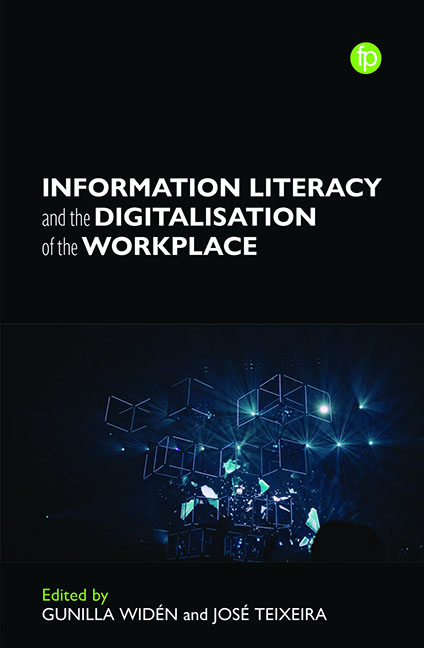Book contents
- Frontmatter
- Contents
- Figures and Tables
- Contributors
- Introduction: Advancing Theory on Workplace Information Literacy
- 1 Literature Review: In Search of the Many Meanings of Information Literacy
- 2 Digital Literacy in a Post-Digital Era: Rethinking ‘Literacy’ as Sociomaterial Practice
- 3 Methodological Choices of Information Literacy in the Workplace: Qualitative, Quantitative or Mixed-Methods?
- 4 Investigating Information Seeking and Information Sharing Using Digital Trace Data
- 5 Making Do With Limited Transparency of Sensitive Information in Secretive Organisations: Collective Information Literacy Through Hinting
- 6 Information Literacy Competencies for Career Transitions in the Digital Age
- 7 The Importance of Information Literacy for Work Satisfaction in a World-Wide-Workplace Context
- 8 Entrepreneurs’ Digital Information Sources Selection: A Perspective on the Impact of Information Literacy and Generational Differences
- 9 Conclusion: Workplace Information Literacy as the Literacy of the Digital Workplace
- Index
3 - Methodological Choices of Information Literacy in the Workplace: Qualitative, Quantitative or Mixed-Methods?
Published online by Cambridge University Press: 17 December 2023
- Frontmatter
- Contents
- Figures and Tables
- Contributors
- Introduction: Advancing Theory on Workplace Information Literacy
- 1 Literature Review: In Search of the Many Meanings of Information Literacy
- 2 Digital Literacy in a Post-Digital Era: Rethinking ‘Literacy’ as Sociomaterial Practice
- 3 Methodological Choices of Information Literacy in the Workplace: Qualitative, Quantitative or Mixed-Methods?
- 4 Investigating Information Seeking and Information Sharing Using Digital Trace Data
- 5 Making Do With Limited Transparency of Sensitive Information in Secretive Organisations: Collective Information Literacy Through Hinting
- 6 Information Literacy Competencies for Career Transitions in the Digital Age
- 7 The Importance of Information Literacy for Work Satisfaction in a World-Wide-Workplace Context
- 8 Entrepreneurs’ Digital Information Sources Selection: A Perspective on the Impact of Information Literacy and Generational Differences
- 9 Conclusion: Workplace Information Literacy as the Literacy of the Digital Workplace
- Index
Summary
Introduction
Digitalisation has not only impacted business and entrepreneurial activities (Urbach et al., 2019), but also workforce activities in workplaces (Farivar and Richardson, 2021). The digital revolution has created a new era of information-based society. Organisations need highly literate workforces to meet the challenges posed by digitalisation as well as the opportunities it presents (Iversen, Smith and Dindler, 2018). Literacy skills, and more fundamentally information literacy (hereinafter IL), have become an increasingly important prerequisite skill for lifelong learning in the 21st century (Lloyd, 2010). The traditional definition of IL refers to the ability to recognise information needs and to identify, assess and use the information (Bruce, 1999). In the workplace, IL includes the ability to use various information sources and tools, synthesise information, evaluate information, use information in practice and share information with colleagues (Gilbert, 2017). While IL has primarily been addressed, examined and measured in the educational context (for example, Jang et al., 2021; Johnston and Webber, 2003; O’Connor, Radcliff and Gedeon, 2002; Nikou and Aavakare, 2021), a few studies have investigated IL in the workplace, addressing the methodological choices and their consequences for workplace IL research (Gilbert, 2017; Widén et al., 2021a).
The aim of this chapter is to focus on the methodological choices (quantitative, qualitative or mixed-methods) that can be used in workplace IL research. This chapter also introduces a relatively new approach for analysing IL in the workplace called ‘fuzzy-set Qualitative Comparative Analysis’ (hereinafter fsQCA) (Ragin, 1987). The fsQCA is an analysis technique and enables researchers to better understand the complexity of workplace IL. It should be noted that we do not engage with philosophical traditions, such as positivism, interpretivism and pragmaticism – they are beyond the scope of this chapter. We recommend that interested readers check Lipu, Williamson and Lloyd (2007) for a better understanding of research philosophies in the context of IL.
This chapter is guided by the following research question: What are the methodological choices for assessing IL in the workplace and what factors should be considered when selecting one?
- Type
- Chapter
- Information
- Publisher: FacetPrint publication year: 2023

